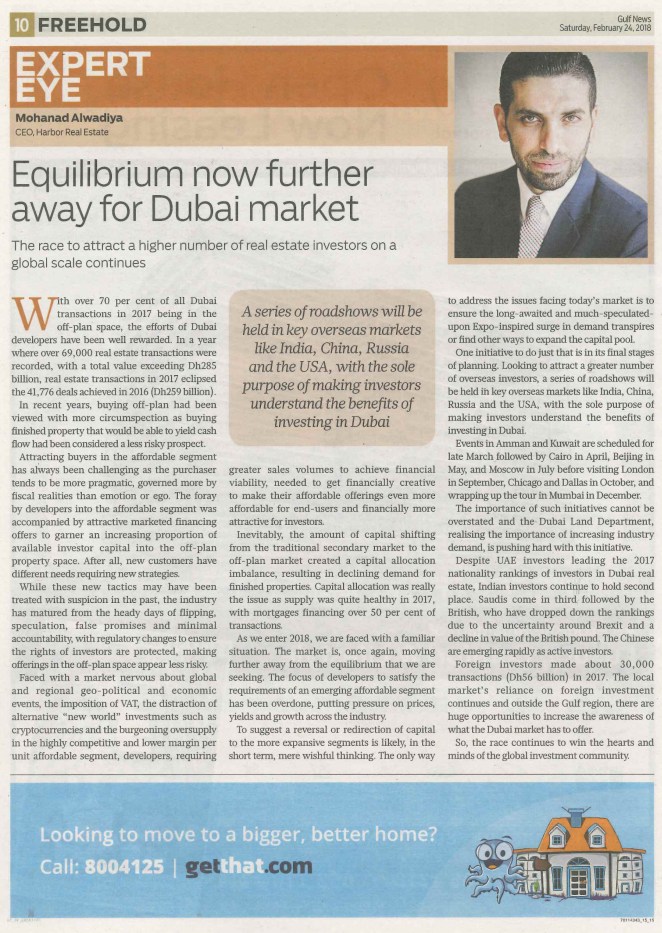There are many alternatives for the property investor in today’s market. Here are just a few of them and why I think each presents significant opportunities to increase my client’s wealth.
Affordable housing
The affordable housing segment in Dubai has outperformed its more luxurious alternative for some time now and continues to show lots of promise. Affordable properties will continue to be in high demand as Dubai’s population growth gains momentum during a period of expected strong economic growth leading up to the end of the decade.
Examples of affordable projects that are providing good rental returns and expected capital appreciation are the Skycourts project and the adjacent QPoint project. Apartments in Skycourts have proven to be very popular with tenants and investors alike and have historically delivered excellent capital growth with some apartment values growing by 20 to 25% % in the 24 months leading up to the correction and shedding no more than 5% reduction in values during the correction with rental premiums of at least 7% not uncommon. Purchasing an apartment at Skycourts has been made even been made more affordable with the developer offering units, some with existing and reliable tenants, with a very attractive easy payment plan. QPoint is also providing rental yields of 6% to 7% and has also showed strong resilience in losing minimal capital value during the correction.
And while the value is irrefutable, he risks associated with investing in the affordable segments of the industry as opposed to the luxury segments are much lower. Demand for this type of affordable accommodation will continue to grow as Dubai’s population swells in the run up to the Expo and the demand for well-located affordable housing increases. As Dubai grows, so will the need for affordable housing.
Hospitality
The rise of Dubai as one of the world most preferred tourist destinations is a remarkable story. Tourism and associated commercial activities are flourishing in Dubai and the focus of investment has been on new projects to grow these important revenues generating economic segments and further diversification. The launch of 2 major theme parks in 2016 will ensure Dubai attracts over 15 million visitors in 2017, continuing a growth trend of approximately 10% per annum since 2010 and is well on track to attracting over 20 million visitors in 2020 with continual investments in infrastructure and attractions expected to generate 25-30 million tourists annually to the emirate by 2030.
The local market offers significant opportunity. The GCC, with a total population of just over 40 million people, has one of the youngest populations in the world. Approximately 50% of the population on the Arabian Peninsula is below 25 years of age. What a wonderful opportunity this represents for Dubai. The possibility exists for the construction of the only mega family entertainment destination in over 2,500,000 square kilometers of territory. From an economic point of view, the provision of memorable entertainment experiences for the youth and families of the region must have a multiplier effect on the economy.
Offices
All things being equal, offices in today’s market can provide an ROI significantly greater than that of residential properties. This is mainly due to lower per sq. ft. capital cost but also reflects the higher levels of risk associated with owning this type of property.
Managing tenants is also more straightforward. You will have a business-to-business relationship with your tenant and many of the emotional issues which can complicate residential leasing arrangements won’t exist. It’s easier to keep interactions professional and focused and relationships are built over time with the opportunity to attract a ‘blue chip’ tenant and are likely to rent your property for a long period and less likely to default on rental payments. In many cases, office tenants and property owner interests are aligned. The tenant wants an efficient operation which presents a favorable impression to his customers, business associates or peers and, in this way, is more likely to assist the owner maintain or even improve the property.
Establishing a true value of the investment is often easier with commercial property. Reviewing the current owners’ income statement and existing lease details will provide a good indication of the likely future cash-flows and help to establish an accurate valuation. Residential properties are often subject to more emotional pricing or developer inefficiency and cost recovery considerations.
In addition to lease rates and periods, negotiations can include such items as provision of fit-out assistance, maintenance, implementation of office and storage systems, insurance, lease to buy provisions and options … the list goes on. The variations are countless.
Labor Camps
One alternative that is not considered very often is the ubiquitous labor camp. Dubai is going through a high construction phase with a growing requirement for construction labor. Demand for this asset type has been very strong and continues to grow. Yields above 15% are not uncommon and by selecting the right tenant, longer term contracts can be negotiated. This investment is certainly worth consideration when economic activity is expected to increase or remain strong for extended periods of time.










